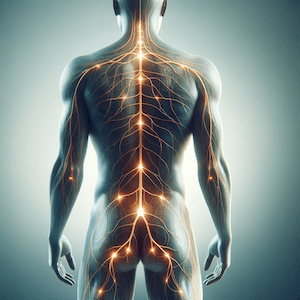Nerve Pain
Article by John Miller
Nerve Pain
What is Nerve Pain?
Nerve pain, also called neuropathic pain, results from damaged or dysfunctional nerves. Unlike regular pain caused by injuries, nerve pain can feel like a burning, stabbing, or shooting sensation, sometimes even resembling an electric shock. It can significantly affect quality of life, making day-to-day activities uncomfortable. Understanding and managing nerve pain is essential for effective treatment.

Why Does Nerve Pain Occur?
Nerve pain occurs when the body’s nervous system sends incorrect signals to the brain, often due to damaged nerves. This might happen due to conditions like diabetes, injuries, or infections, where the nerves are either compressed or irritated.
Read more: Causes of Pinched Nerve Pain | Managing Pain
How is Nerve Pain Diagnosed?
Diagnosing nerve pain involves a comprehensive physical examination and sometimes imaging, such as MRIs or nerve conduction studies. Your physiotherapist or doctor will assess your symptoms and recommend further tests if necessary to understand the root cause.
Read more: Physiotherapy Assessments
What Are Common Causes of Nerve Pain?
Several conditions can lead to nerve pain:
- Pinched nerves due to herniated discs
- Shingles causing post-herpetic neuralgia
- Diabetes leading to diabetic neuropathy
- Sciatica affecting the lower back and legs
- Phantom limb pain post-amputation
- Cancer-related nerve pain
- Multiple sclerosis
- Side effects of chemotherapy
- HIV infection
- Alcoholism-induced nerve damage
Read more: Sciatica Treatment
What Are the Symptoms of Nerve Pain?
Common symptoms include burning, shooting, or stabbing pain, which might worsen over time. You might also feel tingling, numbness, or electric shock-like sensations. These symptoms point to an underlying issue with the nerves.
What Treatments Are Available for Nerve Pain?
Effective treatment for nerve pain often involves a combination of approaches tailored to the cause of the pain. Physiotherapy plays a crucial role in addressing the physical factors contributing to nerve pain. Specific exercises and manual therapies can help relieve pressure on affected nerves and improve mobility. Additionally, your physiotherapist might work with you on posture correction, muscle strengthening, and nerve gliding techniques to alleviate pain.
For more severe cases, medication may be prescribed. This includes options like antidepressants or anti-seizure drugs, which have been shown to modify nerve signals and reduce pain. Certain topical treatments, such as lidocaine patches or capsaicin creams, can also provide localised relief.
In advanced cases, interventional therapies are considered. Nerve blocks—where local anaesthetic or steroids are injected near the affected nerve—can provide temporary but significant pain relief. Minimally invasive procedures like radiofrequency ablation are also available, where targeted heat is applied to the nerve to disrupt pain signals.
Your healthcare team will carefully assess the cause of your nerve pain and work with you to determine the most appropriate treatment plan.
Latest Research on Nerve Pain
Recent advances in neuropathic pain management offer new hope for those struggling with chronic nerve pain. Research has shown that targeted therapies like nerve blocks and non-invasive procedures can significantly reduce pain and improve quality of life (Cavalli et al., 2019). These approaches focus on managing pain more precisely, particularly when conventional treatments prove ineffective.
A key innovation is Peripheral Nerve Stimulation (PNS), which involves applying electrical impulses to peripheral nerves to interrupt pain signals. Studies show that PNS is highly effective in treating chronic pain across various parts of the body, providing an option for individuals who have not responded well to medications.
Another breakthrough is neuromodulation, which modulates the nervous system’s electrical activity to relieve pain. This treatment is particularly valuable for patients who experience side effects from drugs or find that medications do not adequately manage their symptoms.
For more complex and refractory cases, interventional methods like nerve blocks and targeted drug delivery systems are gaining popularity. These strategies offer a way to manage pain without the long-term use of pharmaceuticals, reducing the risk of side effects and complications. (Finnerup et al., 2020)
Though some of these treatments are still in development or early use, they represent a promising shift towards more personalised and non-pharmacological solutions. As research continues, these methods may provide longer-lasting and more effective relief for individuals suffering from neuropathic pain, offering an improved quality of life with fewer side effects. (Moisset X, 2024)
These advances demonstrate a growing trend towards innovative, targeted treatments, providing new options for those living with chronic nerve pain.
FAQs on Nerve Pain
- What causes nerve pain?
Nerve pain can result from conditions such as diabetes, multiple sclerosis, or physical injuries that damage nerves. - How do you treat nerve pain naturally?
Physiotherapy, acupuncture, TENS machines, and mindfulness techniques can provide natural pain relief.
Read more: Natural Nerve Pain Relief - What medications help nerve pain?
Antidepressants, anti-seizure medications, and specific nerve pain relievers are commonly used. - Is physiotherapy effective for nerve pain?
Yes, targeted physiotherapy treatments can help alleviate symptoms and promote healing. - What are common symptoms of nerve pain?
Common symptoms include burning, stabbing pain, and electric shock sensations. - Can nerve pain be cured?
Nerve pain is often managed rather than cured, with treatments focusing on relieving symptoms. - Can a pinched nerve cause permanent damage?
If left untreated, a pinched nerve can lead to long-term damage, including weakness and chronic pain.
Read more: Pinched Nerve Treatment - What exercises help with nerve pain?
Strengthening and stretching exercises prescribed by a physiotherapist can reduce nerve pain. - How is nerve pain diagnosed?
Doctors and physiotherapists use clinical examinations and tests like MRIs to diagnose nerve pain. - Can lifestyle changes help nerve pain?
Yes, maintaining a healthy diet and regular exercise can help manage nerve pain.
Conclusion and What to Do?
Nerve pain is challenging but manageable with the right approach. Physiotherapists and doctors play a vital role in assessing and treating nerve pain. Seek professional advice to explore your treatment options, including physiotherapy, medications, and lifestyle adjustments.
Rochedale - Call 38410277
Book Online: RochedaleSalisbury - Call 32751044
Book Online: SalisburySandgate - Call 32691122
Book Online: SandgateRelated Articles
- Pinched Nerve: Discusses symptoms, causes, and treatment options for a pinched nerve, emphasising the importance of early physiotherapy intervention.
- Sciatica Treatment & Management Strategies: Provides strategies for managing sciatica, including physiotherapy and lifestyle adjustments.
- Neurodynamics: Explores the concept of neurodynamics in physiotherapy, offering insights into treatment strategies for nerve-related issues.
- Effective Pain Relief With TENS Machine: Discusses how TENS machines can be used for pain management, including nerve pain relief.
- Carpal Tunnel Syndrome: Effective Physio Treatments: Details physiotherapy treatments for Carpal Tunnel Syndrome, focusing on relieving wrist and hand pain.
- Tarsal Tunnel Syndrome: Professional Advice: Offers advice on managing tarsal tunnel syndrome, including physiotherapy approaches.
- Piriformis Syndrome: Understanding & Physio Treatment Tips: Provides an overview of Piriformis Syndrome and physiotherapy treatment tips for relieving sciatic nerve compression.
- Bulging Disc: Symptoms, Causes, Treatments, Physio: Explains the symptoms and physiotherapy treatments for a bulging disc, a common cause of nerve pain.
- TENS Machine for Pain Relief: Learn how TENS machines can relieve nerve pain.
- Back Pain and Nerve Issues: Learn about common back issues linked to nerve pain.
- Chronic Pain Management: Explore strategies for managing long-term nerve pain.
- Neurological Physiotherapy: Discover the role of physiotherapy in nerve and brain health.
- Neuropathic Pain – PubMed: Explore scientific studies on neuropathic pain management.
- Latest Research on Nerve Pain – ScienceDirect: Discover the most recent advancements in nerve pain treatment.
- Neuropathy Symptoms and Relief – Mayo Clinic: Find out more about neuropathy symptoms and available treatments.















































